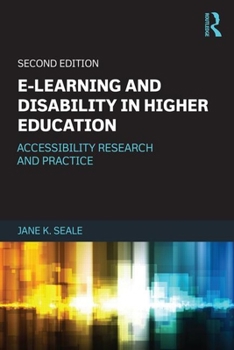E-learning and Disability in Higher Education: Accessibility Research and Practice
Most people working within the higher education sector understand the importance of making e-learning accessible to students with disabilities, yet it is not always clear exactly how this should be accomplished. E-Learning and Disability in Higher Education evaluates current accessibility practice and critiques the extent to which 'best' practices can be confidently identified and disseminated. This second edition has been fully updated and includes a focus on research that seeks to give 'voice' to disabled students in a way that provides an indispensible insight into their relationship with technologies and the institutions in which they study.
Examining the social, educational, and political background behind making online learning accessible in higher and further education, E-Learning and Disability in Higher Education considers the roles and perspectives of the key stake-holders involved in e-learning: lecturers, professors, instructional designers, learning technologists, student support services, staff developers, and senior managers and administrators.





